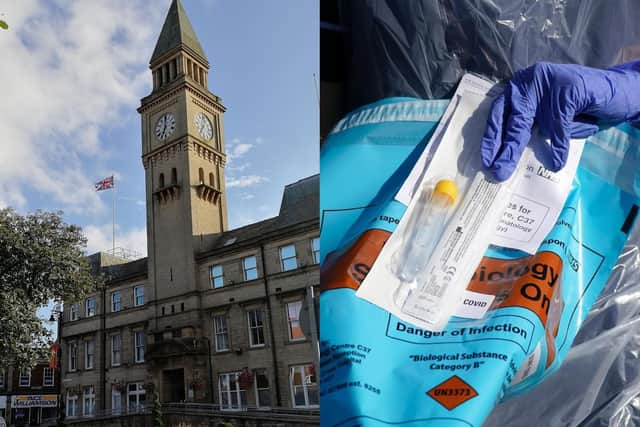Covid cases in Chorley more than double in seven days
and live on Freeview channel 276
In the seven days to 14th May, 56 infections were identified – compared to 22 on the rolling weekly measure a week earlier. That gives Chorley a case rate of 47.4 per 100,000 people, up from 18.6 over the same period – the eleventh-highest in the country according to BBC analysis – and higher than at any point since 6th April.
The borough borders Bolton and Blackburn with Darwen, which have both seen their Covid infection levels rocket as a result of the spread of the variant of the virus first seen in India. The pair currently have the two highest case rates in the UK – but neither of them saw as great an increase as Chorley in the week to 14th May.


Advertisement
Hide AdAdvertisement
Hide AdEarlier this week, Lancashire’s director of public health called on residents across the region to “think local and think twice” about taking advantage of the latest lifting of restrictions on the government’s roadmap out of lockdown.
Dr. Sakthi Karunanithi said that cases of the Indian variant were rising “exponentially” in some parts of the county – citing Central Lancashire as one of them.
He urged people to consider the circumstances in their own area when assessing whether to utilise their new-found freedoms, which, since Monday, have included the ability for up to six people or two households to mix indoors and to visit indoor hospitality venues.
Meanwhile, Bolton Council’s assistant director of public health – speaking to the Local Democracy Reporting Service before the latest figures were published – said that other areas had been “watching closely” to see what happened in the town, which was the first to experience a surge as a result of the new variant.
Advertisement
Hide AdAdvertisement
Hide AdLynn Donkin said that while all local authorities each have their own outbreak management plans that are constantly being refined, Bolton had found particular success in rooting its response in the community – both to identify cases and encourage uptake of the vaccine.
“We’re trying to think about the extra value that we can add – we’ve got door-to-door test kit distribution, local mobile testing units and people going out doing some very detailed community engagement work.
“We do know that these sort of surge-testing exercises do work in finding more cases. It also gives us an opportunity to talk to people about vaccination – so we have got mobile testing units in the community with our vaccination hubs and that’s actually been incredibly successful, we’re absolutely thrilled with how that’s gone.
“Our vaccine bus was actually located on one of our school sites in our surge testing area – and that worked really well, [because] schools are such a core part of the community,” Ms. Donkin said.
Advertisement
Hide AdAdvertisement
Hide AdShe added that education was one of the many aspects of everyday life that risked being turned upside down by rapidly-increasing case rates.
“A significant amount of disruption comes from…having to be isolated from school if there are cases in the community. You have got that knock-on effect then in terms of parents needing to take time off work to home school.
“We really do need to get case rates down – obviously one of the things we’re watching carefully is any impact on hospital activity, particularly, but also health service activity more broadly.”
